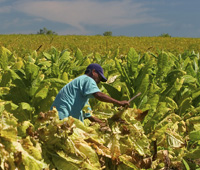Tobacco Buyout Means Changes For Kentucky Agriculture
Tobacco Buyout Means Changes For Kentucky Agriculture

Approval of the tobacco buyout by Congress ends a depression-era farming program and will mean changes for Kentucky agriculture.
“The tobacco quota buyout is probably the most significant policy event that has happened in our state since the development of the tobacco program in the 1930s," said Will Snell, a tobacco policy specialist with the University of Kentucky College of Agriculture. "The buyout will inject millions of dollars into local and rural economies throughout Kentucky annually, but it also will change the landscape of the Kentucky tobacco economy forever.”
Changes will begin with the 2005 crop when price supports, quota and geographic limitations will no longer be in place. Buyout payments will begin next year as well. The buyout is funded by quarterly assessments on tobacco manufacturers and importers based on their share of gross domestic volume, or market share.
The buyout totals $9.6 billion to be divvied out to tobacco farmers over 10 years of which $2.5 billion will be made in payments to Kentucky farmers. Quota owners will receive $7 per pound and those who grow will get $3 per pound, based on 2002 basic and effective quotas, respectively. People who both own quota and grow tobacco would get $10 a pound. Tenants and landlords will split the grower payment according to crop share arrangement. Tobacco grown on an acreage basis, such as dark tobacco, will be converted to a poundage equivalent.
It will also eliminate direct payments farmers have received from tobacco manufacturers as part of a settlement agreement they reached in litigation with states’ attorneys general called Phase II payments.The status of the 2004 payment is unclear at this point.
Buyout efforts and discussions have been ongoing for a number of years with varying compensation amounts, U.S. Food and Drug Administration authority over manufactured tobacco products, and post-program safety nets added and changed throughout the process. In the end, there are no provisions to provide a post-buyout safety net for tobacco growers or geographic restrictions on future production, nor is FDA authority a part of the package.
"Our farmers are disappointed that the buyout dollars were cut, along with the loss of Phase II and the termination of the program,” Snell said. “But the alternative was to watch our quotas and the value of the asset to dwindle away, try to fix a program that may not have a fixable solution beneficial to both quota owners and growers, and perhaps lose it all down the road with no compensation."
In the short term, it is unclear how growers will respond, Snell said. Prices will drop and production costs could as well for growers who will not have to be paying lease prices. Companies will have to provide some price incentives to get the crop grown. From a demand perspective, some lost markets could be reclaimed, but gains will be limited in the short-run in response to competitors adjusting their prices as well.
Possible implications from the buyout include massive concentration, he said. It is estimated that as many as 75 percent of current quota owners and growers likely will stop raising tobacco. Instead, it is likely to be grown among fewer farms and over a smaller geographic area.
Tobacco will likely continue to be grown throughout the state in response to companies wanting to spread tobacco production to offset weather/disease risks, Snell said. But production will move to the lowest-cost regions - those where cropland availability is ample and where soils are the most productive, he said. Consequently, more tobacco will be grown in western Kentucky, while less will be grown in eastern Kentucky. Snell said he expects to see concentration in central Kentucky where there are a number of part-time farmers, but some growers who can produce quality tobacco at low cost may grow more.
In the coming months, farmers will have to make decisions on whether to continue to grow tobacco and make arrangements with tobacco manufacturers to sell the crop. In an effort to keep farmers informed, a question and answer fact sheet with detailed information regarding buyout provisions can be found at tobacco economics online.
Additional information and educational programs of the UK Cooperative Extension Service will focus on the buyout, options for handling and investing the resulting payments, as well as the future of farms, land values and other aspects as farmers enter this new era. For more information contact your local county Extension office.
-30-
